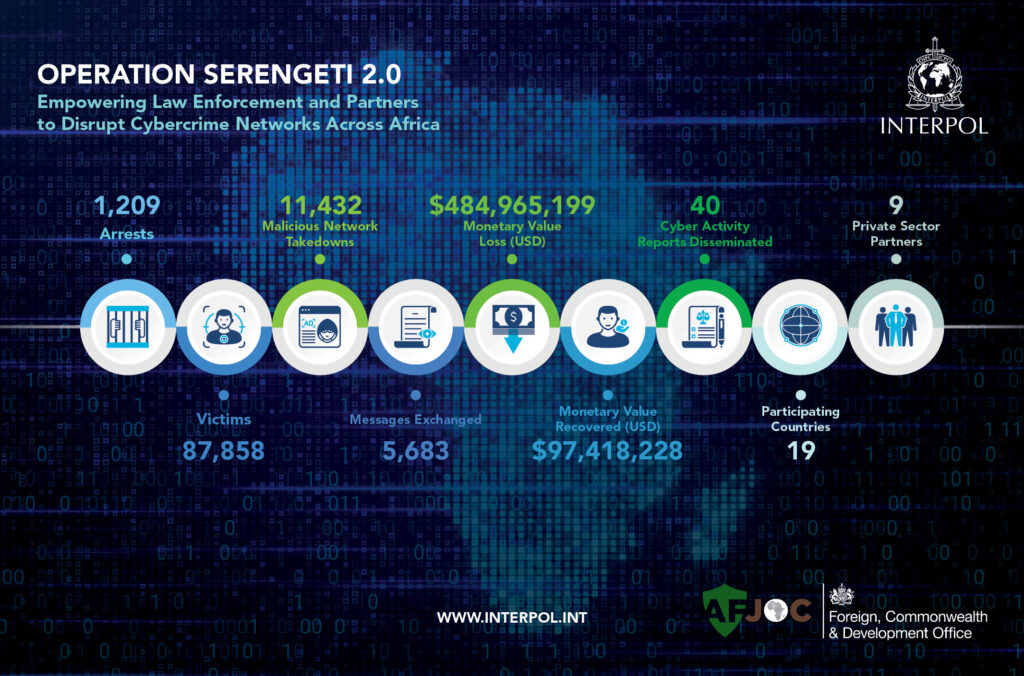Will Interpol’s Serengeti 2.0 crackdown change the cybercrime game in Africa?
- Interpol’s June to August operation in Angola, Zambia and Ivory Coast leads to the recovery of over $97.4 million.
- Sleuths from 18 countries in Africa worked with UK investigators to tackle scams cutting across inheritance scams, ransomware and compromise emails tailored to swindle businesses.
- In Angola, 20 Chinese, who were allegedly mining cryptocurrency among those arrested.
Interpol has arrested 1,209 suspected cybercriminals between June and August this year barely a year after bursting another 1000 individuals over the same criminal activity, unravelling the growing footprint of the evolving crime in African cities.
According to an update by Interpol last week, the latest swoop across cities in Angola, Zambia, and Ivory Coast led to the recovery of an estimated $97.4 million, underscoring the need for cross-border collaboration in neutering scams promising quick money, and therefore success to unsuspecting victims.
Coming barely a year after another swoop that led to the arrest of 1,000 cybercriminals, Interpol two-month operation acts as a wake up call among authorities to firm up cybersecurity checks in the face of emerging technologies such as Artificial Intelligence (AI)-based attacks.
“The operation was strengthened by private sector collaboration, with partners providing intelligence, guidance and training to help investigators act on intelligence and identify offenders effectively. This intelligence was shared with participating countries ahead of the operation, providing critical information on specific threats as well as suspicious IP addresses, domains and C2 servers,” noted Interpol.
Interpol’s Serengeti 2.0 operation
In a sting operation dubbed Serengeti 2.0, sleuths from 18 countries in Africa worked with hawkeyed investigators from the United Kingdom in a joint plan to tackle emerging cybercrimes such as inheritance scams, ransomware and compromise emails tailored to swindle businesses and their executives.
Interpol said the burst up narrowed down on about 88,000 victims all targeted in a blend of online scams and cryptocurrency mining rip-offs. A total of 11,432 malicious infrastructures were destroyed during the operation.

Cryptocurrency mining scam in Angola
In oil rich Angola, Interpol said it managed to dismantle 25 cryptocurrency mining centres during the two-month operation that also led to the arrest of 20 Chinese nationals, who were allegedly mining cryptocurrency the southern African country.
Additionally, over $37 million worth of equipment was also seized from the cryptocurrency miners in Angola. Authorities in Luanda reported that they will be using this equipment to enhance electricity distribution to underserved zones.
What’s more, in neighboring Zambia, Serengeti 2.0 sting operation triggered the collapse of a virtual investment program, which is said to have defrauded over 65,000 people, stripping them of about $300 million in scams fashioned as high-return cryptocurrency investments.
“The scammers lured victims into investing in cryptocurrency through extensive advertising campaigns promising high-yield returns. Victims were then instructed to download multiple apps to participate,” Interpol stated.
It added that in Zambia, up to 15 suspects were arrested complete with the mobile phones, bank account numbers and the online domains that were deployed to defraud thousands of people.

Human trafficking syndicate
In what seems like an expanding criminal network in the southern Africa country, Interpol said its investigation disrupted a suspected human trafficking syndicate.
“Also in Zambia, authorities identified a scam centre and, in joint operations with the Immigration Department in Lusaka, disrupted a suspected human trafficking network. They confiscated 372 forged passports from seven countries.”
Cybercriminals undertaking transnational inheritance scams were also stopped on their tracks in Ivory Coast, where thousands of victims were being lured into committing huge sums of money to seek nonexistent inheritances, leading to the loss of about $1.6 million.
“Despite being one of the oldest-running internet frauds, inheritance scams continue to generate significant funds for criminal organizations,” Interpol noted.
Valdecy Urquiza, Secretary General of Interpol, said: “Each Interpol-coordinated operation builds on the last, deepening cooperation, increasing information sharing and developing investigative skills across member countries. With more contributions and shared expertise, the results keep growing in scale and impact. This global network is stronger than ever, delivering real outcomes and safeguarding victims.”
Interpol’s Operation Serengeti 2.0 was conducted under the African Joint Operation against Cybercrime initiative which is financed by the UK’s Foreign, Commonwealth and Development Office. At the moment, the operational partners are: Kaspersky, , Fortinet, Trend Micro, TRM Labs and Uppsala Security, Group-IB, Team Cymru, The Shadowserver Foundation, and Cybercrime Atlas.
Across the continent, the participating countries are: Kenya, Mauritius, Chad, Côte D’Ivoire, Democratic Republic of Congo, South Africa, Seychelles, Nigeria, Rwanda, Senegal, Tanzania, Angola, Benin, Cameroon, Gabon, Ghana, Zambia and Zimbabwe.
Read also: Why African Banks Need Military-Grade Cybersecurity Measures
Share this content:





Post Comment